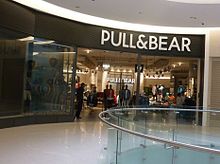Pull&Bear
| Company type | Sociedad unipersonal |
|---|---|
| Industry | Retail |
| Predecessor | New Wear, S.A.fog |
| Founded | 1991 |
| Headquarters | , |
Number of locations | 864 (2021)[1] |
Area served | Worldwide |
| Products | Clothing |
| Revenue | |
Number of employees | 3,000 |
| Parent | Inditex |
| Divisions |
|
| Website | www |

Pull&Bear (Spanish: [pul am ˈbeɾ]) is a Spanish clothing and accessories retailer based in Narón, A Coruña, Galicia, founded in 1991.[1] It is part of Inditex, owner of Zara and Bershka brands.
History
[edit]The chain was established in 1991 due to the diversification of Inditex's commercial objective, which at that time had only Zara stores. It started out as a brand only for the male public, but after a few years of its creation, it introduced a collection for girls in 1998 that has equaled the male line in sales.
In 2010, the brand introduced a new logo and rebranded its European stores.
In February 2019, Pull&Bear partnered with the sports brand Umbro to jointly launch a line of sportswear products.[2]
In March 2022, Pull&Bear ceased operations in Russia in support of Ukraine.[3]
Description
[edit]Pull&Bear specializes in manufacturing and selling urban style clothing and accessories.[4] The brand uses US popular culture in its product design.
New product lines introduced in stores have diversified the range of products available in Pull&Bear outlets. These new lines include; music, technology, video games and video images mixed in with clothing. Pull&Bear introduced the "XDYE" line in 1998, a more sporty and hi-tech line of clothes linked to the icons of 21st-century youth culture.
Stores
[edit]
The number of Pull&Bear stores in each country :[5]
|
Africa:
Americas:
Asia:
|
Europe:
|
References
[edit]- ^ a b c "Annual Report 2021" (PDF). Inditex S.A. Retrieved 30 January 2022.
- ^ "Pull&bear gains ground in athleisure through an alliance with Umbro". www.themds.com. Retrieved 2019-06-04.
- ^ "Spanish fashion retail giant Inditex closes 502 stores in Russia". www.aa.com.tr. Retrieved 2023-01-28.
- ^ "INDITEX Group - Pull and Bear". Archived from the original on 2010-03-17. Retrieved 2009-12-22.
- ^ "Presencia internacional - inditex.com". Archived from the original on 2016-04-19. Retrieved 2015-09-09.
